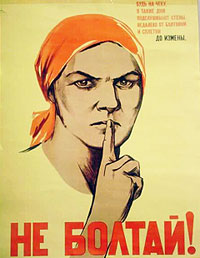Don't Talk
Tai Adelaja - Russia Profile - russiaprofile.org - 7.13.12 - JRL 2012-128
On a Personal Note - Editorial Comment by Russia Profile Staff
Russia Profile brings you some of the best analysis on top stories in Russia today. But there's always more behind them. Each Friday, our writers provide their own take on the news, offering unique commentary to put events into a different perspective. This week, both Tai Adelaja and Dan Peleschuk wonder if Russia is heading straight back to its Soviet period, albeit for different reasons.

file photoA parallax snap of the Soviet epoch is almost impossible without a cursory look at the Soviet posters. And one of the most popular posters of that colorful and distressful period is the "Don't Talk" poster. The friendly injunction imprinted on that poster will come in handy these days, when the Kremlin is struggling to retain its powers to control speech.
Russia's latest defamation legislation, which criminalizes both libel and insult, could impose a maximum fine of up to five million rubles ($152,965) on violators, RIA Novosti reported, citing Pavel Krasheninnikov, a United Russia deputy who co-authored the bill. The second and final reading of the bill is expected to take place in the State Duma on Friday, after a successful first reading on Wednesday.
A provision in the bill considered on Wednesday imposes a maximum fine of 500,000 rubles ($15,200) and imprisonment of up to five years on offenders. But, after a not-quite-unexpected intervention from Russian President Vladimir Putin, Krasheninnikov said legislators will jettison the requirement for a prison term and restrict punishment to fines and community labor.
Opposition leaders and human rights activists have protested the bill, saying it will make life unbearable for journalists and media in the country. A handful of journalists, including from Rolling Stone magazine, RIA Novosti and Gazeta.ru reportedly gathered in front of the State Duma on Friday to protest the bill.
The pro-Kremlin United Russia Party appears to be making the "crushing of dissent" its full-time job.
Defamation was decriminalized in December under then-President Dmitry Medvedev and is currently punishable by a fine of up to 3,000 rubles ($90). But Krasheninnikov said that the current penalty is "ineffective" and that decriminalization "hadn't led to anything good." He is yet to indicate, however, whether the new maximum penalty would apply only to legal entities or to individuals as well.
Since there have been no known precedents of prosecution for libel cases in Russian criminal courts, critics say inexperienced judges are likely to resort to wild interpretation of the new law. Meanwhile, authors of the bill have expressed optimism that deputies will adopt it before the end of the spring session, paving the way for it to come into force on October 1.
Keywords: Russia, Government, Politics, Putin Power - Russian News - Russia
On a Personal Note - Editorial Comment by Russia Profile Staff
Russia Profile brings you some of the best analysis on top stories in Russia today. But there's always more behind them. Each Friday, our writers provide their own take on the news, offering unique commentary to put events into a different perspective. This week, both Tai Adelaja and Dan Peleschuk wonder if Russia is heading straight back to its Soviet period, albeit for different reasons.

file photoA parallax snap of the Soviet epoch is almost impossible without a cursory look at the Soviet posters. And one of the most popular posters of that colorful and distressful period is the "Don't Talk" poster. The friendly injunction imprinted on that poster will come in handy these days, when the Kremlin is struggling to retain its powers to control speech.
Russia's latest defamation legislation, which criminalizes both libel and insult, could impose a maximum fine of up to five million rubles ($152,965) on violators, RIA Novosti reported, citing Pavel Krasheninnikov, a United Russia deputy who co-authored the bill. The second and final reading of the bill is expected to take place in the State Duma on Friday, after a successful first reading on Wednesday.
A provision in the bill considered on Wednesday imposes a maximum fine of 500,000 rubles ($15,200) and imprisonment of up to five years on offenders. But, after a not-quite-unexpected intervention from Russian President Vladimir Putin, Krasheninnikov said legislators will jettison the requirement for a prison term and restrict punishment to fines and community labor.
Opposition leaders and human rights activists have protested the bill, saying it will make life unbearable for journalists and media in the country. A handful of journalists, including from Rolling Stone magazine, RIA Novosti and Gazeta.ru reportedly gathered in front of the State Duma on Friday to protest the bill.
The pro-Kremlin United Russia Party appears to be making the "crushing of dissent" its full-time job.
Defamation was decriminalized in December under then-President Dmitry Medvedev and is currently punishable by a fine of up to 3,000 rubles ($90). But Krasheninnikov said that the current penalty is "ineffective" and that decriminalization "hadn't led to anything good." He is yet to indicate, however, whether the new maximum penalty would apply only to legal entities or to individuals as well.
Since there have been no known precedents of prosecution for libel cases in Russian criminal courts, critics say inexperienced judges are likely to resort to wild interpretation of the new law. Meanwhile, authors of the bill have expressed optimism that deputies will adopt it before the end of the spring session, paving the way for it to come into force on October 1.